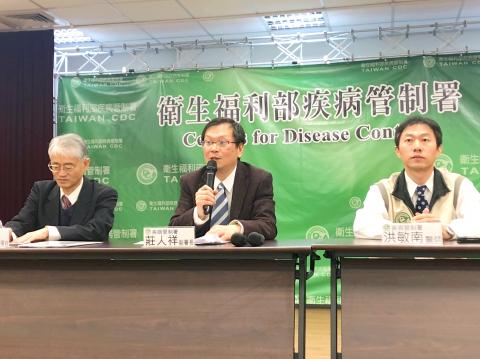The Centers for Disease Control (CDC) yesterday issued a level-2 travel alert for Wuhan, China, following a field survey in the city by two Taiwanese experts, as well as Japan and Thailand confirming cases linked to a pneumonia outbreak.
The cause of the outbreak has been identified as a new type of coronavirus, with Chinese authorities saying that as of Wednesday, 41 people had been infected, including six in critical condition and one fatality.
CDC Communicable Disease Control Medical Network commander Chuang Yin-ching (莊銀清) and epidemic prevention doctor Hung Min-nan (洪敏南), who conducted the survey in Wuhan from Monday to Wednesday, yesterday told a news conference in Taipei that 30 percent of the Wuhan patients had no direct exposure to the Huanan Seafood City market, the suspected epicenter of the outbreak.

Photo: Wu Liang-yi, Taipei Times
During clinical visits, they observed that patients who are obese or have previously undiagnosed illnesses seemed to be at higher risk of serious complications, Chuang said.
The CDC hopes to clarify whether human-to-human transmission is possible, Hung said, adding that “limited human-to-human transmission” was possibly identified during their visit.
Limited human-to-human transmission generally means that people within 1m of an infected person for about 10 minutes could contract a disease, meaning members of the same household or medical professionals treating infected patients are at higher risk, the CDC said.
In the cases of a married couple infected in Wuhan, the husband worked at the market, but the wife, who had not recently been to the market due to limited mobility, might have contracted the illness from her husband, Hung said.
Of the 41 cases in Wuhan, nearly 70 percent had direct exposure to the market, but 13 patients did not, meaning the source of the outbreak remains a mystery, he said.
Possible explanations provided by China include limited human-to-human transmission, a two-week latent period and an unknown source of infection, Hung said, adding that Chinese authorities have stepped up efforts to collect animal specimens for research.
Chinese authorities have prohibited people who have had close contact with patients from leaving Wuhan, hoping to curb the spread of the disease, Chuang said.
Taipei would not prohibit Taiwanese in Wuhan from returning to Taiwan, CDC Deputy Director-General Chuang Jen-hsiang (莊人祥) said, adding that people traveling to Wuhan should avoid traditional markets and hospitals, as well as contact with wild animals or livestock.
As the Lunar New Year is approaching, the agency said that it has intensified border inspections, while Premier Su Tseng-chang (蘇貞昌) said that as it is the high season for influenza, people should get vaccinated as early as possible.

The Central Election Commission has amended election and recall regulations to require elected office candidates to provide proof that they have no Chinese citizenship, a Cabinet report said. The commission on Oct. 29 last year revised the Measures for the Permission of Family-based Residence, Long-term Residence and Settlement of People from the Mainland Area in the Taiwan Area (大陸地區人民在台灣地區依親居留長期居留或定居許可辦法), the Executive Yuan said in a report it submitted to the legislature for review. The revision requires Chinese citizens applying for permanent residency to submit notarial documents showing that they have lost their Chinese household record and have renounced — or have never

A magnitude 5.6 earthquake struck off the coast of Yilan County at 12:37pm today, with clear shaking felt across much of northern Taiwan. There were no immediate reports of damage. The epicenter of the quake was 16.9km east-southeast of Yilan County Hall offshore at a depth of 66.8km, Central Weather Administration (CWA) data showed. The maximum intensity registered at a 4 in Yilan County’s Nanao Township (南澳) on Taiwan’s seven-tier scale. Other parts of Yilan, as well as certain areas of Hualien County, Taipei, New Taipei City, Taoyuan, Hsinchu County, Taichung and Miaoli County, recorded intensities of 3. Residents of Yilan County and Taipei received

Taiwan has secured another breakthrough in fruit exports, with jujubes, dragon fruit and lychees approved for shipment to the EU, the Ministry of Agriculture said yesterday. The Animal and Plant Health Inspection Agency on Thursday received formal notification of the approval from the EU, the ministry said, adding that the decision was expected to expand Taiwanese fruit producers’ access to high-end European markets. Taiwan exported 126 tonnes of lychees last year, valued at US$1.48 million, with Japan accounting for 102 tonnes. Other export destinations included New Zealand, Hong Kong, the US and Australia, ministry data showed. Jujube exports totaled 103 tonnes, valued at

BIG SPENDERS: Foreign investors bought the most Taiwan equities since 2005, signaling confidence that an AI boom would continue to benefit chipmakers Taiwan Semiconductor Manufacturing Co’s (TSMC, 台積電) market capitalization swelled to US$2 trillion for the first time following a 4.25 percent rally in its American depositary receipts (ADR) overnight, putting the world’s biggest contract chipmaker sixth on the list of the world’s biggest companies by market capitalization, just behind Amazon.com Inc. The site CompaniesMarketcap.com ranked TSMC ahead of Saudi Aramco and Meta Platforms Inc. The Taiwanese company’s ADRs on Tuesday surged to US$385.75 on the New York Stock Exchange, as strong demand for artificial intelligence (AI) applications led to chip supply constraints and boost revenue growth to record-breaking levels. Each TSMC ADR represents